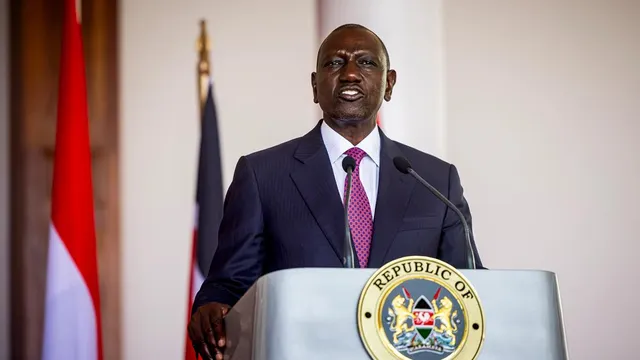
William Ruto strengthens ties with China amid US trade tensions
2025-04-25 11:36- Kenyan President William Ruto visited China amid escalating US-China trade tensions.
- Ruto emphasized the need for closer ties with China and signed multiple agreements.
- This diplomatic engagement marks a strategic pivot for Kenya in its quest for economic stability.
Express your sentiment!
Insights
Kenya recently witnessed a significant diplomatic move as President William Ruto visited China, marking his third trip to Beijing since taking office in 2022. The visit occurred amid escalating trade tensions between Washington and Beijing, prompting Ruto to express Kenya's desire to enhance bilateral relations with China. During his five-day visit, Ruto outlined Kenya’s goals to learn from China's governance and economic development strategies, seeking support from Xi Jinping for various sectors like health and education. The Kenyan leader also criticized the U.N. Security Council and the current global order, suggesting that the trade war initiated by the U.S. might lead to a systematic upheaval. The discussions between Ruto and Xi Jinping resulted in multiple agreements focused on security, technology, and economic cooperation. These agreements are viewed as essential for reinforcing the long-standing partnership between the two nations, particularly as Kenya looks to balance its relationships amid global trade challenges. The Kenyan president acknowledged the support received from China for key infrastructure projects, which have benefited Kenya’s development greatly over the years. Beyond the scope of trade, this diplomatic engagement illustrates the shifting dynamics in international relations resulted from U.S. tariffs aimed at China. As a response to Washington's protectionist policies, Kenya and many other African nations are aiming to explore and diversify their trade partnerships. China's presence in Africa, characterized by major investments and extensive trade agreements, positions it as a crucial player in this evolving landscape, especially as countries like Kenya seek alternatives to U.S. markets. Ruto's outreach to China, along with newfound agreements signed during his visit, suggests a significant pivot in Kenya’s foreign policy. The strategic alignment with China not only enhances Kenya’s market access but also aligns with aspirations for development and regional leadership amidst global uncertainties. The agreements represent a proactive approach as Kenya seeks to ensure its economic interests are safeguarded in a world where trade relationships are being redefined.
Contexts
Sino-African relations have undergone significant development over the past two decades, shaped by a mutual interest in economic growth and strategic partnerships. China has emerged as one of Africa's largest trading partners, surpassing traditional relationships with Western nations. The cooperation is often characterized by investment in infrastructure, trade, and energy sectors, which are vital for Africa's economic development. China's Belt and Road Initiative (BRI) has further solidified these ties, as it seeks to enhance trade routes and create connections across continents, culminating in more robust Sino-African trade relations. The partnership between China and African countries is multifaceted, involving not just economic investments but also cultural exchange and cooperation on international platforms. Educational scholarships for African students in Chinese universities, the establishment of Confucius Institutes, and cultural exchanges have fortified people-to-people ties. Additionally, African nations have garnered increased influence within international forums, thanks to China's support, particularly in the United Nations and other multilateral organizations. This collaboration has provided African countries with more leverage in global governance, challenging the traditional dominance of Western countries. However, this relationship is not without its challenges and criticisms. Concerns regarding debt sustainability have been raised, as some African countries struggle to repay loans that fund Chinese-led projects. Critics argue that these investments could lead to a form of neocolonialism, where African nations find themselves overly reliant on Chinese financial support and influence. Moreover, there are worries about labor practices and environmental standards in Chinese projects, raising questions about the long-term benefits for local communities. The balance of power in this relationship is continually being debated, emphasizing the need for African nations to leverage their partnerships for growth while ensuring sustainable practices. Looking ahead, Sino-African relations are likely to evolve, focusing more on sustainable development and mutual benefit. As both sides address existing challenges, there is a growing recognition that successful cooperation must prioritize local capacity building and environmental sustainability. Future engagements may push for more equitable terms, with African nations increasingly asserting themselves in negotiations. Ultimately, the trajectory of Sino-African relations will depend on effective communication, shared goals, and a commitment to a partnership that fosters genuine growth for both sides.